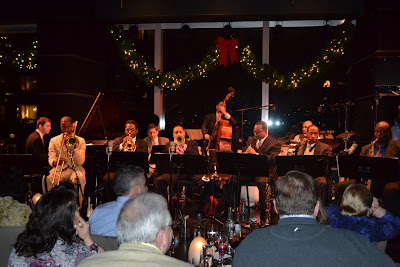




Wynton Marsalis: The Music of Jelly Roll Morton & King Oliver
Story and photos by Dwight Casimere
-JALC Artistic Director Wynton Marsalis with Dwight Casimere
-Master Drummer Yacub Addy (r)
-JALC Orchestra at Dizzy's Club Coca Cola
New York—“All jazz is modern,” Wynton Marsalis, Artistic Director, Jazz at Lincoln Center declared, before embarking on an exploration of the music of Jelly Roll Morton and King Oliver at Dizzy’s Club Coca Cola. The concerts were carried in live video stream on the internet and on local National Public Radio stations around the country.
Marsalis’s New Year’s Eve weekend concerts served as a vehicle to explore the music of nearly a century ago, in order, he explained, to better understand the music of today. “When you listen to this music, you realize that this is the source. This is where it all comes from.” With that, Marsalis and his Lincoln Center Jazz Orchestra launched into King Oliver’s “Dipper Mouth Blues,” which Marsalis later said was named in honor of Oliver’s second trumpet, a then-newcomer by the name of Louis Armstrong. "In the early days, before he became Satchmo, his nickname was Dipper Mouth.” Besides Marsalis’s searing trumpet solos, clarinetist Victor Goines ignited the solo passages of this up-tempo, bright homage to the greatest jazz trumpeter of the last century, Armstrong, as played by the greatest jazz trumpeter of this century, Marsalis.
Trumpeter Marcus Printup and Tenor sax Walter Blanding then proceeded to raise the roof on Jelly Roll Morton’s New Orleans Bump. Afterwards, Morton’s Dead Man Blues started with the elegiac ring of a cowbell and a short dialogue from the band members, which bemused the passing of a stranger. Spearheaded by Ricky “Dirty Red” Gordon on washboard and percussion, the orchestra then launched into a funeral dirge accented by Chris Crenshaw, the youngest member of the band, on trombone. Dueling clarinets from reedists Victor Goines and Walter Blanding, with extended solos by Ali Jackson on drums and James Chirillo on banjo and Carlos Henriquez on bass, brought home the exquisite nature of the point, counterpoint, almost fugue-like character of early jazz.
“The thing you’ll notice about this music,” Marsalis later explained, “is that sometimes, everybody plays at once. At times, it sounds like they’re almost fighting!” Victor Goines' elongated notes and prolonged passages created an excitement that really kicked the entire proceeding up a notch. “They used to call Jelly Roll the ‘Bard of New Orleans,” Marsalis explained. Dead Man Blues demonstrated why.
Pianist Dan Nimmer, with his encyclopedic keyboard knowledge, moved effortlessly between the stride piano percussiveness of yesteryear to the McCoy Tyner-tinged aggressiveness of the avant-garde.
The most exquisite moments of the evening occurred when Marsalis himself launched into extended trumpet solos. Early jazz seems to bring out the best in him. He not only plays from his soul, he reaches into the imprint of his DNA to reveal the music that spawned his musical genius. Perhaps the most revealing moments came at the end of the concert, when African Master Drummer Yacub Addy joined Marsalis and the orchestra. The collaboration further demonstrated the cultural roots and timeless expression of music that is as relevant today as it was at its inception nearly a hundred years ago.
Upcoming engagements at Dizzy’s Club Coca Cola include MLK Celebration with Warren Wolf Quintet Jan 16, The Music of Max Roach with Willie Jones III Sextet Jan 17-22 and Victor Goines leading his own Quintet Jan 31. For information, visit jalc.org/dccc.
No comments:
Post a Comment